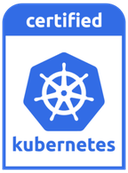6.4 KiB
Typhoon 
Typhoon is a minimal and free Kubernetes distribution.
- Minimal, stable base Kubernetes distribution
- Declarative infrastructure and configuration
- Free (freedom and cost) and privacy-respecting
- Practical for labs, datacenters, and clouds
Typhoon distributes upstream Kubernetes, architectural conventions, and cluster addons, much like a GNU/Linux distribution provides the Linux kernel and userspace components.
Features 
- Kubernetes v1.16.0 (upstream)
- Single or multi-master, Calico or flannel networking
- On-cluster etcd with TLS, RBAC-enabled, network policy
- Advanced features like worker pools, preemptible workers, and snippets customization
- Ready for Ingress, Prometheus, Grafana, CSI, or other addons
Modules
Typhoon provides a Terraform Module for each supported operating system and platform.
| Platform | Operating System | Terraform Module | Status |
|---|---|---|---|
| AWS | Container Linux / Flatcar Linux | aws/container-linux/kubernetes | stable |
| Azure | Container Linux | azure/container-linux/kubernetes | alpha |
| Bare-Metal | Container Linux / Flatcar Linux | bare-metal/container-linux/kubernetes | stable |
| Digital Ocean | Container Linux | digital-ocean/container-linux/kubernetes | beta |
| Google Cloud | Container Linux | google-cloud/container-linux/kubernetes | stable |
A preview of Typhoon for Fedora CoreOS is available for testing.
| Platform | Operating System | Terraform Module | Status |
|---|---|---|---|
| AWS | Fedora CoreOS | aws/fedora-coreos/kubernetes | preview |
| Bare-Metal | Fedora CoreOS | bare-metal/fedora-coreos/kubernetes | preview |
Documentation
- Architecture concepts and operating-systems
- Tutorials for AWS, Azure, Bare-Metal, Digital Ocean, and Google-Cloud
Example
Define a Kubernetes cluster by using the Terraform module for your chosen platform and operating system. Here's a minimal example.
module "google-cloud-yavin" {
source = "git::https://github.com/poseidon/typhoon//google-cloud/container-linux/kubernetes?ref=v1.16.0"
# Google Cloud
cluster_name = "yavin"
region = "us-central1"
dns_zone = "example.com"
dns_zone_name = "example-zone"
# configuration
ssh_authorized_key = "ssh-rsa AAAAB3Nz..."
asset_dir = "/home/user/.secrets/clusters/yavin"
# optional
worker_count = 2
}
Initialize modules, plan the changes to be made, and apply the changes.
$ terraform init
$ terraform plan
Plan: 64 to add, 0 to change, 0 to destroy.
$ terraform apply
Apply complete! Resources: 64 added, 0 changed, 0 destroyed.
In 4-8 minutes (varies by platform), the cluster will be ready. This Google Cloud example creates a yavin.example.com DNS record to resolve to a network load balancer across controller nodes.
$ export KUBECONFIG=/home/user/.secrets/clusters/yavin/auth/kubeconfig
$ kubectl get nodes
NAME ROLES STATUS AGE VERSION
yavin-controller-0.c.example-com.internal <none> Ready 6m v1.16.0
yavin-worker-jrbf.c.example-com.internal <none> Ready 5m v1.16.0
yavin-worker-mzdm.c.example-com.internal <none> Ready 5m v1.16.0
List the pods.
$ kubectl get pods --all-namespaces
NAMESPACE NAME READY STATUS RESTARTS AGE
kube-system calico-node-1cs8z 2/2 Running 0 6m
kube-system calico-node-d1l5b 2/2 Running 0 6m
kube-system calico-node-sp9ps 2/2 Running 0 6m
kube-system coredns-1187388186-dkh3o 1/1 Running 0 6m
kube-system coredns-1187388186-zj5dl 1/1 Running 0 6m
kube-system kube-apiserver-controller-0 1/1 Running 0 6m
kube-system kube-controller-manager-controller-0 1/1 Running 0 6m
kube-system kube-proxy-117v6 1/1 Running 0 6m
kube-system kube-proxy-9886n 1/1 Running 0 6m
kube-system kube-proxy-njn47 1/1 Running 0 6m
kube-system kube-scheduler-controller-0 1/1 Running 0 6m
Help
Ask questions on the IRC #typhoon channel on freenode.net.
Motivation
Typhoon powers the author's cloud and colocation clusters. The project has evolved through operational experience and Kubernetes changes. Typhoon is shared under a free license to allow others to use the work freely and contribute to its upkeep.
Typhoon addresses real world needs, which you may share. It is honest about limitations or areas that aren't mature yet. It avoids buzzword bingo and hype. It does not aim to be the one-solution-fits-all distro. An ecosystem of Kubernetes distributions is healthy.
Social Contract
Typhoon is not a product, trial, or free-tier. It is not run by a company, does not offer support or services, and does not accept or make any money. It is not associated with any operating system or platform vendor.
Typhoon clusters will contain only free components. Cluster components will not collect data on users without their permission.
Donations
Typhoon does not accept money donations. Instead, we encourage you to donate to one of these organizations to show your appreciation.